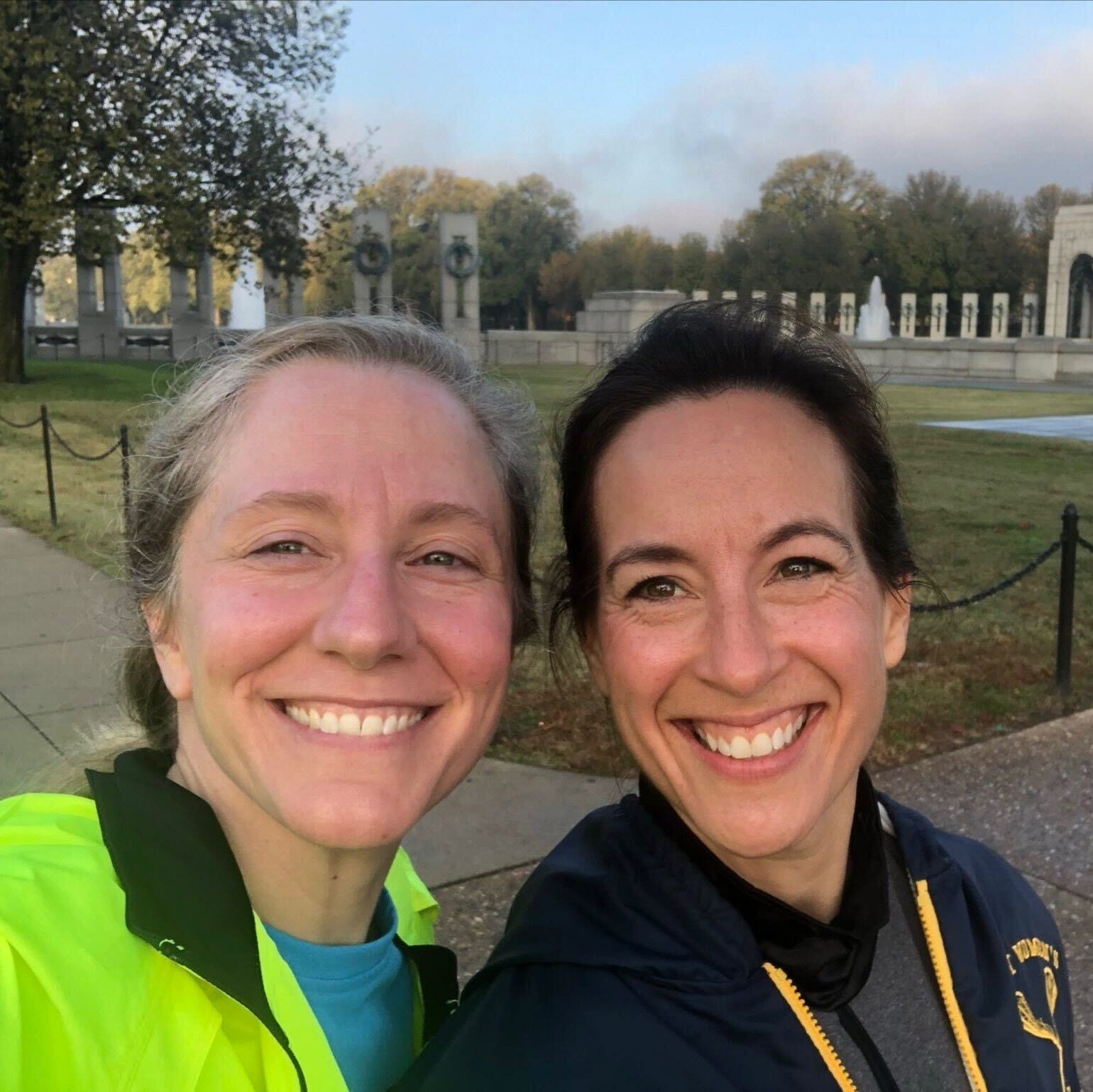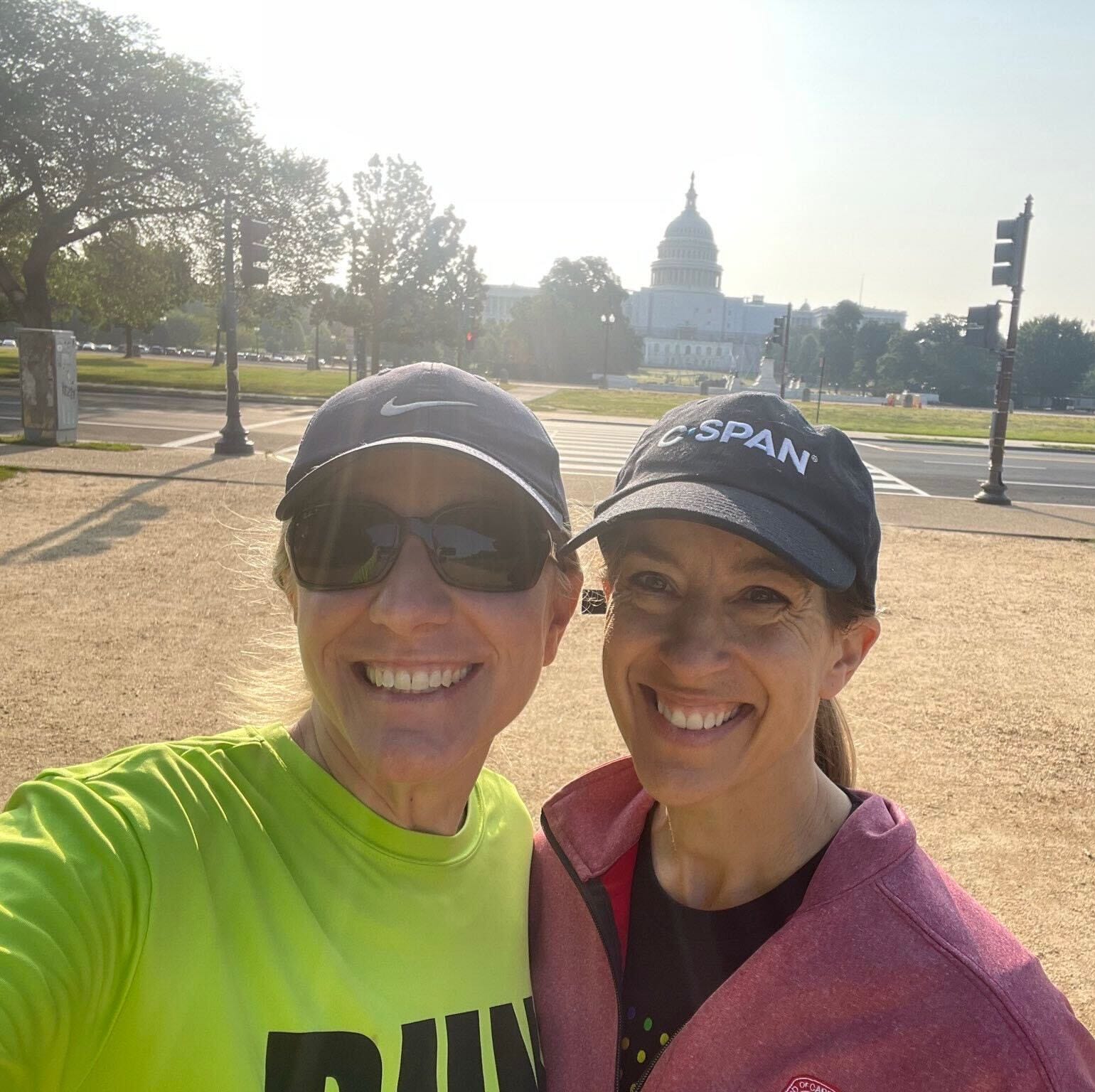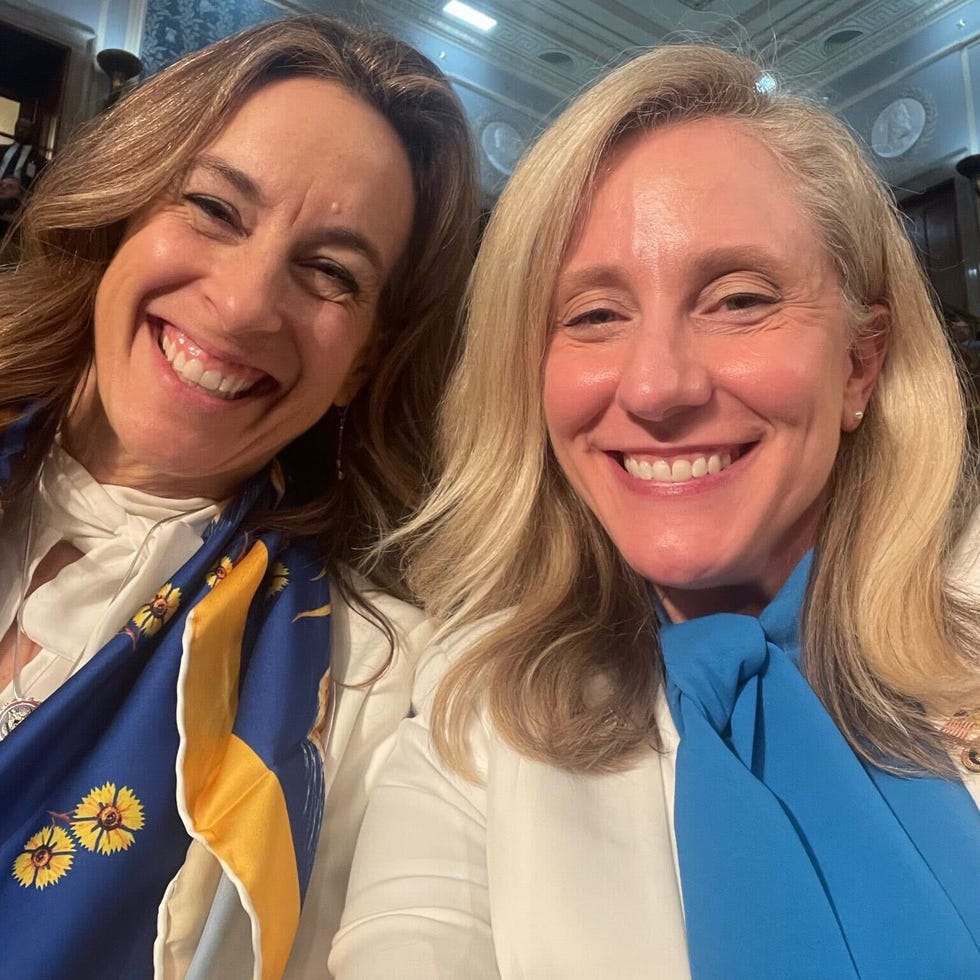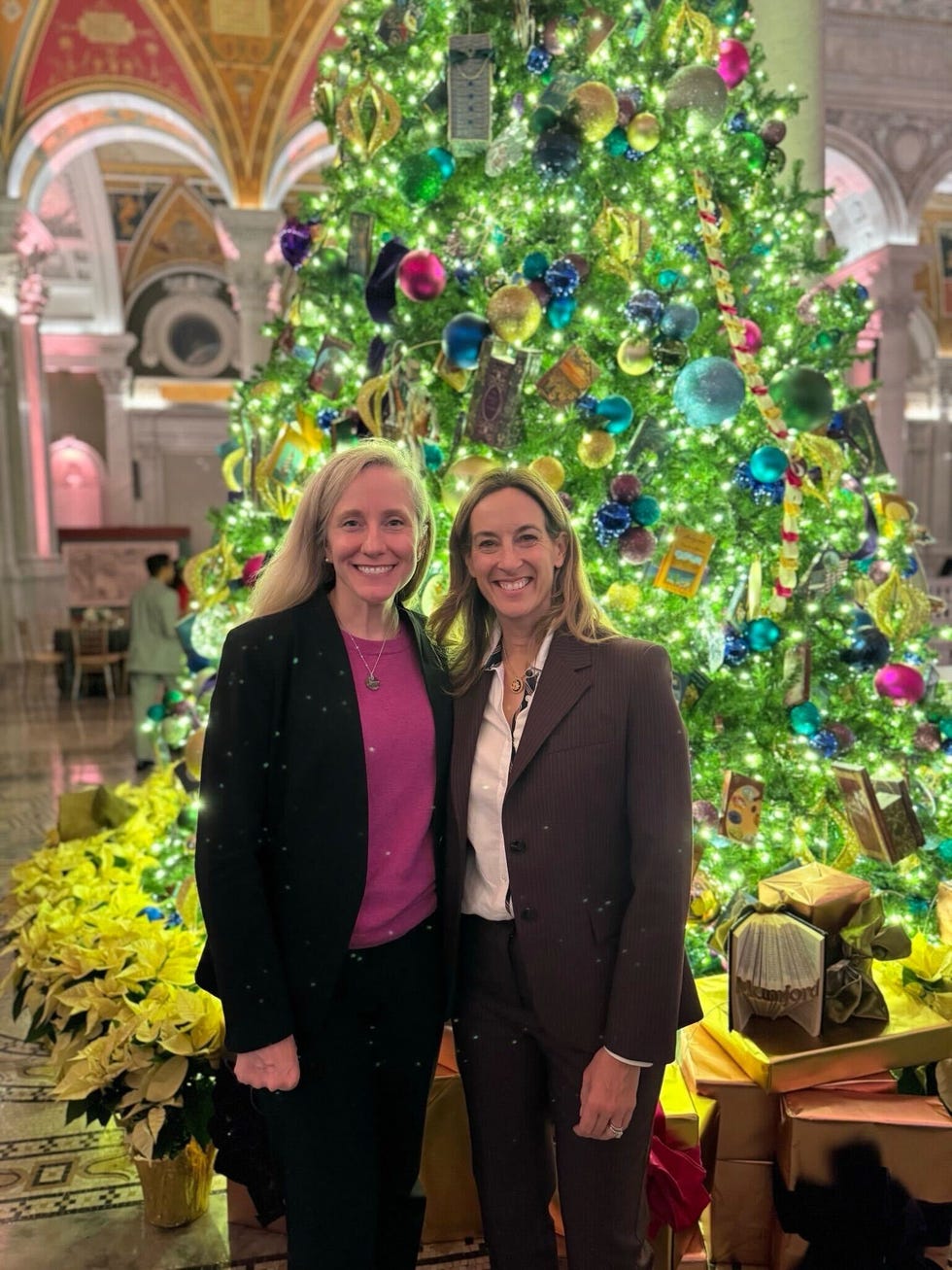Abigail Spanberger has a simple explanation for all this. She knows how she became a CIA case officer focused on counterterrorism, and how she succeeded as a three-term congresswoman—elected to the House of Representatives in 2018 when Democrats took back control of that chamber during Donald Trump’s first administration. She knows how she won her race to represent Virginia’s 7th district at the same time that a former naval helicopter pilot named Mikie Sherrill was elected to represent New Jersey’s 11th, and how the two became fast friends in Washington D.C. She knows how both are now running for governor in their respective home states—two of the most-watched races of the year.
It’s just not that complicated: “Mikie and I are both the eldest of three sisters,” Spanberger explains. “So that’s the essential piece.”
There are all kinds of credentials that can boost a candidate for higher office, but few political mailers mention birth order. Big mistake, per Spanberger. Huge. Eldest girls get shit done.
That’s how Sherrill and Spanberger feel, the two report in a series of interviews conducted as both campaign for their state’s highest office, after winning their Democratic primaries earlier this month. They’re relieved to have a place to put their energies and ambitions after a bruising election for Democrats, and grateful to have something to do while others wring their hands.
After a presidential race, most voters have to wait until the next midterm election to register their approval or disapproval for the president’s policies—more than 16 long months from now. President Donald Trump was of course elected in November 2024, and beleaguered Democrats have been counting down to 2026 for the chance to put a check on the executive branch’s power and force a referendum on his controversial agenda.
In the lead up, the mood has been grim. Democrats do not control either branch of Congress, and their ranks lack a clear leader and a cohesive vision for winning back the voters who drifted toward Trump or sat out the last election. But people in Virginia and New Jersey do not have to bide their time much longer. Both states are gearing up to hold gubernatorial races this November, some of the first bellwether elections that will indicate what voters think of the direction in which America is headed under the Trump administration.
For months now, while strategists and pundits have mourned on weekend cable news talk shows and backstabbed each other in Politico pieces, Spanberger and Sherrill have been on the road—and trading notes. Two candidates (and former roommates, having shared an apartment during their time in Congress), running to add their names to the meager list of women who have ever been governor in the United States (a grand total of 51), both hoping to be the first women to do so from their states. “It gives us this organizing principle,” Sherrill says of the purpose she has found in campaigning. “I go across the state, and I see hundreds and hundreds of people [who] want to see a governor that is going to stand up and fight.”
Spanberger insists she doesn’t have some grand prescription for her fellow Democrats, so much as she has a personal conviction about how to win and how to govern. At events, she likes to tell people that she knows what it’s like to represent a lot of people who voted for her and a lot of people who didn’t. Sometimes those people are standing in the room with her, waiting to hear her make her case. That suits her. Persuasion is important, and it’s part of the job, but if Spanberger can’t win a voter over, she at least wants to feel sure she can explain her record to them.
“I am of the opinion that if I am advocating for policies that I think are good, then I have to be willing to pitch them wherever,” she says. “I have to be willing to defend them even to people who don’t agree.” In a purple state like Virginia, which has a Republican governor but voted for Kamala Harris in the presidential election, that has meant framing her positions with care. When Spanberger is talking about climate change, for example, she leads with the non-partisan assessment that rising sea levels are a threat to national security and that extreme weather is hurting agriculture in her state.
“It’s our job to bring people to the table,” she says. “Even if they’re coming for different reasons.” In this race, she has put affordable housing, funding for rural hospitals, and education at the center, drawing on her bipartisan record in Congress and her state’s distaste for the infamous DOGE cuts in Washington, which ensnared Virginia—a home base for federal workers.
Sherrill has made similar moves, using her soapbox to give voice not just to her moral outrage at the goings-on in Washington, but also to the real economic impact those actions are having in New Jersey.
For months now, the two have kept up via text on the trail, a stream-of-consciousness thread that Sherrill says runs the gamut from vexing political issues to memes to child care woes to “a lot of ‘Oh my god, I can’t believe this just happened’” moments. Spanberger uses the back-and-forth to vent about “the mundane things.” Scheduling issues, for starters. “Having someone else handle your schedule has never been comfortable for either one of us. We like to have control over all aspects of our lives,” Spanberger says. “It’s usually me who is like, ‘This schedule is making me nuts.’” But the simple fact of both of them taking on these races has calmed her: “It just makes it seem less big, because it’s like, ‘Oh, I have a friend who is doing the same thing that I’m doing. It makes it feel a bit more normal.”
“I feel incredibly fortunate,” Sherrill adds, “because who would’ve guessed when we entered Congress together that of the only two statewide races going on in the entire country all these years later, I’d be in it with a good friend of mine.”
Sherrill and Spanberger met in person at an event in the run-up to their 2018 congressional elections. They knew of their shared background in national security, and had also been hearing about each other for months from a more personal surrogate: Sherrill’s sister Mary, who lives in Virginia and had become one of Spanberger’s “super volunteers.” “I tried to call her one morning, and she was like, ‘I can’t talk right now. I’m hosting a canvassing lunch for Abigail,’” Sherrill remembers. “And I was like, ‘Well, I’m busy, too. I’m running for Congress.’”
After meeting, the two kept in touch, and “then once we got elected, we were just friends,” Spanberger says. Their incoming class of representatives included other women who’d served in national security or the armed forces, including Representatives Chrissy Houlahan, Elaine Luria, and Elissa Slotkin. “And the group of us just gravitated towards one another.”
“I think we had visions that we’d be hanging out,” Sherrill says, laughing. “Little did we know that as frontline members of Congress, there would be no hanging out. There was lots of late-night policy work, though.”
“Which, ultimately, I think can be fun!” Spanberger adds, with the real enthusiasm for legislative fine print that only someone who has chosen a career in elected office can muster.
Later, she and Sherrill nabbed committee appointments, and operated an informal network comprised of the same pragmatic women elected alongside them to keep each other in the loop on the latest on foreign affairs or armed services or veterans affairs. “People who had been [in Congress] before us seemed to think of it as a zero-sum game,” Sherrill says. She remembers a more seasoned representative describing the chamber as an “every man for himself” kind of place. “And I remember thinking, ‘Well I’m glad I’ve entered with this group of women, because we’re going to be able to work together.’ And that was true.”
Spanberger decided to run for governor first. Sherrill followed. Neither goes so far as to say they’re glad to be free of Washington, but both describe the exhilaration of pursuing this office—executive leadership, no-holds-barred decision-making power.
When Spanberger arrived in the House, she was “cast as being relatively bossy, which is fine,” she says. She made no secret of her moderate positions despite the progressive wave sweeping centrist members out of office. She has never held back her criticism of tactics or stances she finds unhelpful. She has, as she puts it, “lots of opinions.” She would like to have the chance to enact them.
“The things I want to get done on a state level—I know they can get done much, much faster than what I know to be the process in Congress,” Spanberger says. “And I say that even as someone who got things done. There is so much more that we can be doing at the state level to lower health care costs, prescription drug costs, to do better on education, which for me was a driver in deciding to get in the race for governor at all.”
Sherrill is proud of the work she did in Washington, but she knew what she was doing when she left it behind. When it became clear that New Jersey would have an open Senate seat in 2024, a power broker encouraged Sherrill to run for that office instead of pursuing the governor’s mansion. Open Senate seats are rare, and the person felt Sherill had a good shot. “I was told, ‘Being governor is hard because the buck stops there,’” she recalls. “And I couldn’t understand it, because that’s what I love about running this race. I love the idea that the buck stops there.”
Over the next few months, Sherrill and Spanberger will be spending most of their time within state lines, which means they will see much less of each other than they did when they were roommates on the Hill. Spanberger isn’t planning to take a vacation this summer, but she likes the idea of motoring up to New Jersey to visit her friend at some point. She presumes—she hopes!—both of them will soon be in office, so she acknowledges the inconvenience for the state police who would have to follow her on a trip.
But wouldn’t it be nice? Two pals, two governors, two moms, two eldest daughters with control issues—just catching up.











